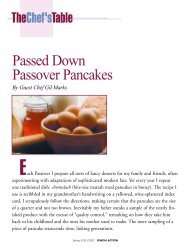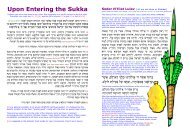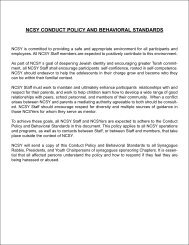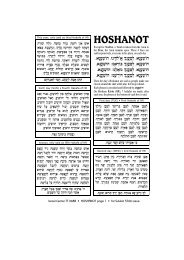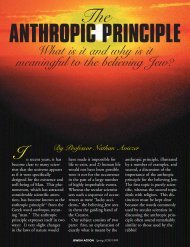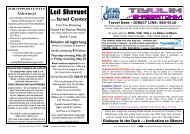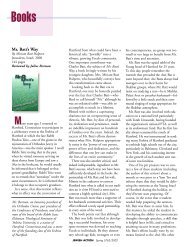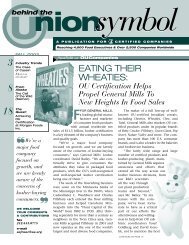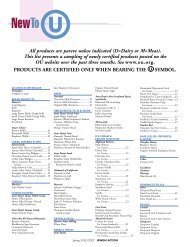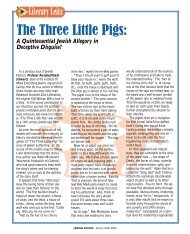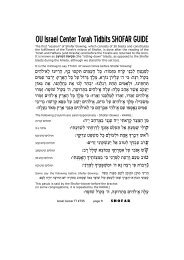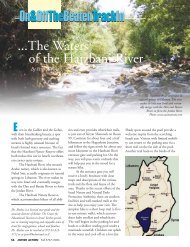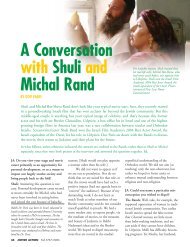Create successful ePaper yourself
Turn your PDF publications into a flip-book with our unique Google optimized e-Paper software.
of fellow Jews. However, with the potential for Kiddush<br />
HaShem and its opposite, depending upon what one does, it is<br />
important to go out of one's way to return a lost item to a<br />
nonJew as well. This too is part of halacha, not just a nice<br />
thing to do.<br />
[S>22:4 (1)] Nor may one ignore a fellow's beast of burden that<br />
has collapsed under its load [540,L270 22:4]. One is required to<br />
help his fellow load his animals [541,A203 22:4].<br />
Sefer HaChinuch points out that this mitzvapair applies to<br />
other animals, not just donkey, and it applies to people as well,<br />
by reasoning a KAL VACHOMER. If you see a fellow human<br />
overloaded with what he/she is carrying (or trying to carry), it<br />
is a mitzva to help out.<br />
[S>22:5 (5)] Men and women may not interchange apparel<br />
[542,543; L39, 40 22:5] nor do certain things that are specific<br />
to the opposite sex.<br />
Targum Yonatan on this pasuk defines male apparel as the<br />
mitzvot of Talit and T’filin. Since these mitzvot are WORN,<br />
and not just performed, he considers them specific male<br />
mitzvot that women may not fulfill. Many other authorities<br />
disagree and consider women to be exempt from these two<br />
mitzvot, but not forbidden to them.The view of Targum<br />
Yonatan, even if not considered the definitive p’sak on the<br />
issue, is probably responsible for the Jewish facts of life <br />
namely, that although many women accept upon themselves<br />
OTHER timerelated positive mitzvot from which they are<br />
officially exempt, this is not the common case with Talit and<br />
T’filin.<br />
[P>22:6 (2)] When one happens upon a (kosher) bird's nest (in<br />
the wild), it is forbidden to take the mother bird alone or with<br />
her eggs/chicks [544,L306 22:6], but one may (must? this is the<br />
subject of a dispute with a decidedly kabalistic flavor on the<br />
side that suggests it is an imperative) take the eggs/chicks if<br />
one first sends the mother bird away [545,A148 22:7]. This is<br />
an enigmatic mitzva that defies logic. It is shrouded in<br />
mysticism, more so than most mitzvot.<br />
Although our Sages attribute kindness to animals as the reason<br />
(or part of the reason) for some mitzvot e.g. not muzzling an<br />
animal that is working with food, helping to unload a beast of<br />
burden, not plowing with an ox and a donkey together they<br />
(our Sages) were more cautious with this mitzva of<br />
SHILU’ACH HAKEN. It can be argued that it is far kinder to<br />
leave a nest alone than to chase away the mother bird (which is<br />
simultaneously kind and cruel one way of looking at it). This<br />
mitzva is more CHOKlike than other mitzvot involving<br />
animals.<br />
Shlishi Third Aliya 29 p'sukim 22:823:7<br />
[S>22:8 (2)] One is required to build a protective fence around<br />
one's (habitable) roof [546,A184 22:8]. It is forbidden to leave<br />
safety hazards on one's property [547,L298 22:8].<br />
Oral law defines these mitzvot as more inclusive than just one's<br />
roof. Rabbinic law, "taking the Torah's lead", extends "safety &<br />
health" rules further into many areas, e.g. secondary smoking.<br />
Rambam says that a person may not tell others: "Don't tell me<br />
what to do; if I want to risk my health or life, it's my business".<br />
Saying this can make a person liable to the punishment of<br />
MAKAT MARDUT. This is something to keep in mind when<br />
you decide to "talk to" your favorite smoker.<br />
One may not plant mixed grains in a vineyard [548,L216 22:9],<br />
nor may one eat the resulting products [549,L193 22:9].<br />
"Strangely", these two mitzvot share a parsha.<br />
[S>22:10 (2)] Plowing with ox and donkey together is<br />
forbidden, as is the tying together of any noncompatible<br />
animals (or humans) for any purpose [550,L218 22:10].<br />
Rambam holds that the Torah prohibits any combination of a<br />
kosher and non kosher animal, based on the fact that the<br />
Torah's example is one of each. Rambam says that<br />
combinations of two kosher or two nonkosher animals is<br />
forbidden by Rabbinic law. Many authorities challenge<br />
Rambam's distinction and say that it is all Torah law.<br />
Do not wear Shaatnez (garments of wool and linen) [551,L42<br />
22:11]<br />
[S>22:12 (1)] ...put tzitzit on all fourcornered garments that<br />
you wear. [counted elsewhere]<br />
[S>22:13 (7)] It is a mitzva to marry according to Jewish Law<br />
and for the husband to write a K'TUBA for his wife with<br />
various promises and assurances [552,A213 22:13].<br />
If a man had falsely accused his (betrothed) wife of infidelity,<br />
he may not divorce her (unless she so desires) [553,554;<br />
A219,L359 22:19]. Penal ties are also paid to the girl's family<br />
for the insult.<br />
[S>22:20 (2)] If the betrothed maiden did, in fact, willfully,<br />
intentionally have relations with another man, and there are<br />
kosher witnesses and properly ad ministered warning, and all<br />
the other rules of evidence. then she is an adulteress and is<br />
executed (stoning).<br />
[S>22:22 (1)] If a man and married woman has relations<br />
(knowing fullwell the married status of the woman), and<br />
neither was forced, then they are both subject to the death<br />
penalty for adultery. [This prohibition is counted from<br />
Commandment #7]<br />
[S>22:23 (2)] The same applies if the woman is “just”<br />
betrothed (this is more than engagement in our time). The<br />
specific incident of stoning is generalized to the mitzva upon<br />
the court to carry out the punishment of "stoning" when<br />
required [555, A220 22:24].<br />
[S>22:25 (3)] Both consenting parties to a forbidden<br />
relationship are culpable. However, if it is possible to consider<br />
the woman an unwilling partner, then she must not be punished.<br />
We must not punish anyone who might not be responsible for<br />
their action [556,L294 22:26]. This is the source of giving<br />
people the benefit of the doubt. This does not mean that the<br />
person always deserves the benefit of the doubt. Maybe they<br />
actually sinned. The answer, it will have to be left to Gd to<br />
punish them; we are obligated to explain the situation as in this<br />
example certainly the girl screamed but there was no one to<br />
save her.<br />
[S>22:28 (2)] A man who forces himself on an unmarried<br />
maiden must pay a fine to her father. If the girl wants to be<br />
married to the man, he must marry her and never initiate<br />
divorce (she, of course, may insist that she wants nothing to do<br />
with him and then the court will force him to divorce her had<br />
they married) [557,558;A218,L358 22:29].<br />
[S>23:1 (1)] A man may not marry his father's former wife<br />
(even after his father's death).<br />
[S>23:2 (1)] Castrated men (it depends on how their situation<br />
happened) have marriage restrictions [559,L360 23:2]<br />
[S>23:3 (1)] A "mamzer" has marriage restrictions [560,L354<br />
23:3]. Mamzer is the offspring of a union that is prohibited by<br />
Israel Center TT #633 (.pdf version) · page 3 · Shabbat Parshat KI TEITZEI



